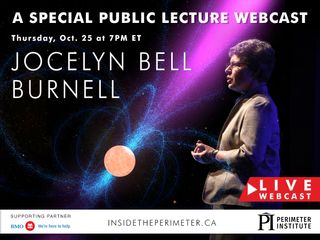One of the biggest names in astrophysics is giving a talk this Thursday (Oct. 25), and you can watch it live online.
The Perimeter Institute for Theoretical Physics in Ontario, Canada, will host a public lecture Thursday at 7 p.m. EDT (2300 GMT) by Jocelyn Bell Burnell, who recently won the $3 million Special Breakthrough Prize in Fundamental Physics for the 1967 discovery of pulsars, as well as her five decades of scientific leadership since then.
You can watch the lecture live here at Space.com when the time comes, courtesy of the Perimeter Institute. [What Are Pulsars?]
You can also view it directly via the Institute.
British astrophysicist Bell Burnell (then known as Jocelyn Bell) was a graduate student at the University of Cambridge in England when she made her epic find more than 50 years ago. She noticed an odd signal in the data gathered by the radio telescope she and her thesis supervisor, Antony Hewish, had helped build — a pulse that repeated every 1.3 seconds.

This mysterious pulse seemed like something an advanced alien civilization might produce, so Bell Burnell and her colleagues (playfully) called it "Little Green Man-1." But she soon spotted additional pulses in the dataset and realized that such signals probably had a natural explanation.
Indeed, the researchers had discovered pulsars — fast-spinning neutron stars whose beams of radiation seem to pulse because they sweep over Earth at regular intervals. (Neutron stars are the superdense corpses of massive stars that have died in supernova explosions.)
Get the Space.com Newsletter
Breaking space news, the latest updates on rocket launches, skywatching events and more!
"Dame Bell Burnell will take our theatre and online audiences on a journey into the realm of pulsars, and share stories from her personal journey of scientific discovery," Perimeter Institute representatives wrote in a description of the upcoming lecture. "The title of her talk evokes the moment she noticed something peculiar in experimental data, and how that peculiar find launched her career: 'What is that?!' The Discovery of Pulsars: A Grad Student's Story.'"
The find netted Hewish the Nobel Prize in physics in 1974, which he shared not with Bell Burnell but with fellow English radio astronomer Martin Ryle. Bell Burnell has said she's not upset about losing out on a Nobel — that she understands honoring research-team leaders and supervisors and not graduate students.
Bell Burnell, of course, became an important leader in the astrophysics community over time, as the Breakthrough Prize committee noted in its award announcement. She has been president of both the Institute of Physics and the Royal Astronomical Society, and she's currently a visiting professor of astrophysics at the University of Oxford in England and Chancellor of the University of Dundee in Scotland.
Bell Burnell will use the $3 million to help groom future scientists like herself. She plans to donate all of it to fund physics graduate students from underrepresented groups, to bring greater diversity to the field.
Mike Wall's book about the search for alien life, "Out There," will be published on Nov. 13 by Grand Central Publishing. Follow him on Twitter @michaeldwall. Follow us @Spacedotcom or Facebook. Originally published on Space.com.
Join our Space Forums to keep talking space on the latest missions, night sky and more! And if you have a news tip, correction or comment, let us know at: community@space.com.

Michael Wall is a Senior Space Writer with Space.com and joined the team in 2010. He primarily covers exoplanets, spaceflight and military space, but has been known to dabble in the space art beat. His book about the search for alien life, "Out There," was published on Nov. 13, 2018. Before becoming a science writer, Michael worked as a herpetologist and wildlife biologist. He has a Ph.D. in evolutionary biology from the University of Sydney, Australia, a bachelor's degree from the University of Arizona, and a graduate certificate in science writing from the University of California, Santa Cruz. To find out what his latest project is, you can follow Michael on Twitter.
Most Popular

